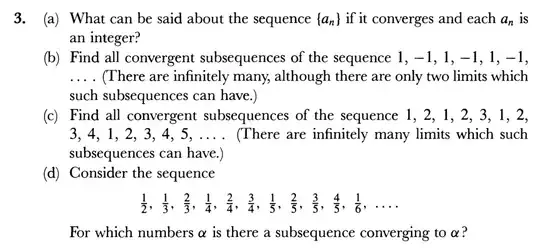The answer book says that $\alpha \in [0,1]$ but I couldn't produce a good reasoning, in fact, all I could do was write the sequence as $a_n \in\{\frac{m}{n},\ \ 0 \lt m \lt n \}$ for a given $n$ but that isn't a well-defined function which makes for a useless construct.
Asked
Active
Viewed 168 times
2 Answers
1
For any rational number $0<\frac p q<1$ with $\gcd(p,q)=1$ we have the subsequence
$$\frac p q,\frac {2p}{2q},\ldots,\frac {np}{nq} \to \frac pq$$
and
$\frac1n \to 0$
$\frac{n-1}n \to 1$
and since rationals are dense in the reals the result follows.
Refer to the related
user
- 154,566
0
The given sequence is an enumeration of the rational numbers in $[0,1]$, and the rational numbers are dense in $[0,1]$ so you can find a sequence which converges to any real number in $[0,1]$.
Burrrrb
- 1,528
